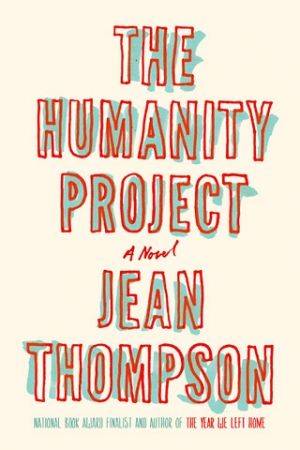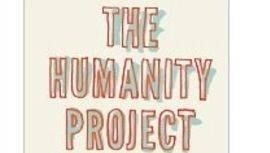Although I’m an avid reader, I struggle with books who have no likable characters. Call them anti-heroes or unreliable narrators or whatever, I just prefer to have somebody to relate to. Who wants to read a book about some total asshole?
 The cast of characters in local author Jean Thompson’s The Humanity Project include Sean, the down-on-his-luck slacker; Connor, Sean’s teenage son who must sacrifice his future to care for his father; Art, a college professor who avoids all serious conversations; Linnea, Art’s daughter who reunites with him after a shooting at her school; and Christie, Art’s downstairs neighbor. All of these characters are deeply flawed and unpleasant. For the young ones, it isn’t really their fault; but the older characters seem to need someone to tell them to get their heads out of their asses. Sean’s chapters are especially tiresome because he seems to believe he is owed more than he’s willing to work for.
The cast of characters in local author Jean Thompson’s The Humanity Project include Sean, the down-on-his-luck slacker; Connor, Sean’s teenage son who must sacrifice his future to care for his father; Art, a college professor who avoids all serious conversations; Linnea, Art’s daughter who reunites with him after a shooting at her school; and Christie, Art’s downstairs neighbor. All of these characters are deeply flawed and unpleasant. For the young ones, it isn’t really their fault; but the older characters seem to need someone to tell them to get their heads out of their asses. Sean’s chapters are especially tiresome because he seems to believe he is owed more than he’s willing to work for.
Perhaps this was by design, but the character that I disliked the most is Christie, the new-age quasi-Buddhist. The Four Noble Truths, which focus on the removal of desire to prevent suffering, provide Christie the license to completely detach herself from her feelings and the feelings of people around her. Thompson presents a veiled criticism of Buddhism, particularly the inherent flakiness of detachment. Christie is never truly happy because she represses all emotion so that she is unable to create and maintain lasting relationships.
Whereas I may not have liked any of the characters, the writing is so colorful and has humor so dry that you may need a drink of water afterward. Thompson describes a high school English class as follows: “They were reading Maya Angelou so they would know something about black people.” Thompson manages to encapsulate in one sentence the current idealogical push toward culturally-responsive teaching, while addressing the reality of what students really get out of it. Later, a man notes that “his wife’s eyebrows rose and hovered like some old-time Applause-O-Meter, except here the dial went from exasperation to alarm.” The book is written like poetry due to Thompson’s ability to find the just-right word for every situation, making it a pleasure to read.
 Aside from the unconventional descriptions and wry humor, the most beautifulaspects of The Humanity Project are the first-person plural vignettes that set the tone for each third of the book. In the first, Thompson writes, “We were losing the future that had been promised to us, although now that we thought about it, we couldn’t remember getting anything in writing.” Within these vignettes is a subtle commentary on the current political situation in the United States: foreclosures, bankruptcy, mistrust of politicians; a hell of our own construction. The second juxtaposes the many views of a society: “We were aware that while some of us kept pets that were named and loved, others of us scissored the ears of fighting dogs.” Thompson seems to question how the same society could be responsible for both the love of and cruelty toward animals.
Aside from the unconventional descriptions and wry humor, the most beautifulaspects of The Humanity Project are the first-person plural vignettes that set the tone for each third of the book. In the first, Thompson writes, “We were losing the future that had been promised to us, although now that we thought about it, we couldn’t remember getting anything in writing.” Within these vignettes is a subtle commentary on the current political situation in the United States: foreclosures, bankruptcy, mistrust of politicians; a hell of our own construction. The second juxtaposes the many views of a society: “We were aware that while some of us kept pets that were named and loved, others of us scissored the ears of fighting dogs.” Thompson seems to question how the same society could be responsible for both the love of and cruelty toward animals.
My biggest complaint about The Humanity Project is its predictability. I possess no great intellect, but 34 pages into the book I had already pieced together some major plot points. I am uncertain whether the author deliberately left obvious clues, or whether it was Thompson’s attempt at cleverness. Either way, it is somewhat discouraging to read a book and find that the characters’ lives intersect in exactly the way you had anticipated they would.
The Humanity Project is all about the grey area of whether people are inherently good or evil. Despite the ugliness that each of the five main characters encounter, Thompson leans toward hopefulness for humanity rather than despair. The third vignette discusses the possibilities in our lifetimes. It concludes, “while some of these had to do with money, which might always be beyond our reach, there was also love, which was not.” It is a counter to Christie’s belief that the answer to suffering is ceasing desire. Instead, Thompson seems to argue, the end to suffering is love. This makes for a very satisfying message for a book that focuses mainly on the darker sides of human nature. It’s not a book for the beach, but it’s an excellent book to enjoy if you ever feel your brain turning into mushy mush.








